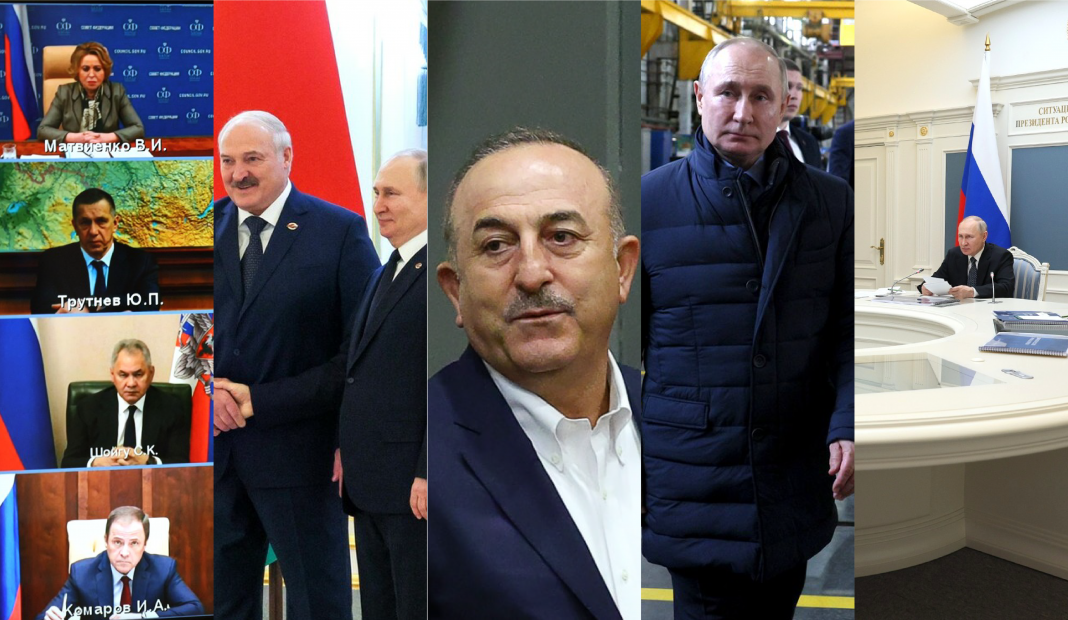This report describes the key events that had an important impact on the political, economic and social processes inside Russia.
Based on the results of the past week, the following trends can be summarised:
- Putin demonstrates a focus on strengthening all sorts of alliances and associations. Regular telephone conversations with the leaders of Armenia, Azerbaijan, Tajikistan and Kyrgyzstan demonstrate a desire to resolve regional conflicts and strengthen ties. An attempt to speed up the process of implementing the Union State with Belarus is also reaching a new level, demonstrating several shortcomings and outright failures in the strategy of the Russian Federation.
- Increased social tension also affects the situation with the temporarily occupied territories of Ukraine. The demonstration of integration processes and large-scale restoration of infrastructure is faced with a banal lack of sufficient resources, which is increasingly difficult to hide behind loud statements about economic stability. Of course, we are not talking about an imminent economic crisis and curtailment of activities in these territories – in general, the Russian economy demonstrates resistance to sanctions. At the same time, observing the cost optimisation process is already possible.
- As the presidential elections approach, the domestic political struggle intensifies. Therefore, it is hardly worth discussing a severe opponent’s presence. At the same time, studying the leading technologies that Kremlin technologists will use soon is already possible. In the last digest, Ascolta analysed in detail the activities of Yevgeny Prigozhin as a potential technical candidate in the upcoming elections. Apparently, it is worth paying attention to Alexander Dyumin or other representatives of Putin’s inner circle in the near future.
During April 3rd-9th the following topics were the most relevant for Russia:
- Meeting between Vladimir Putin and Alexander Lukashenko
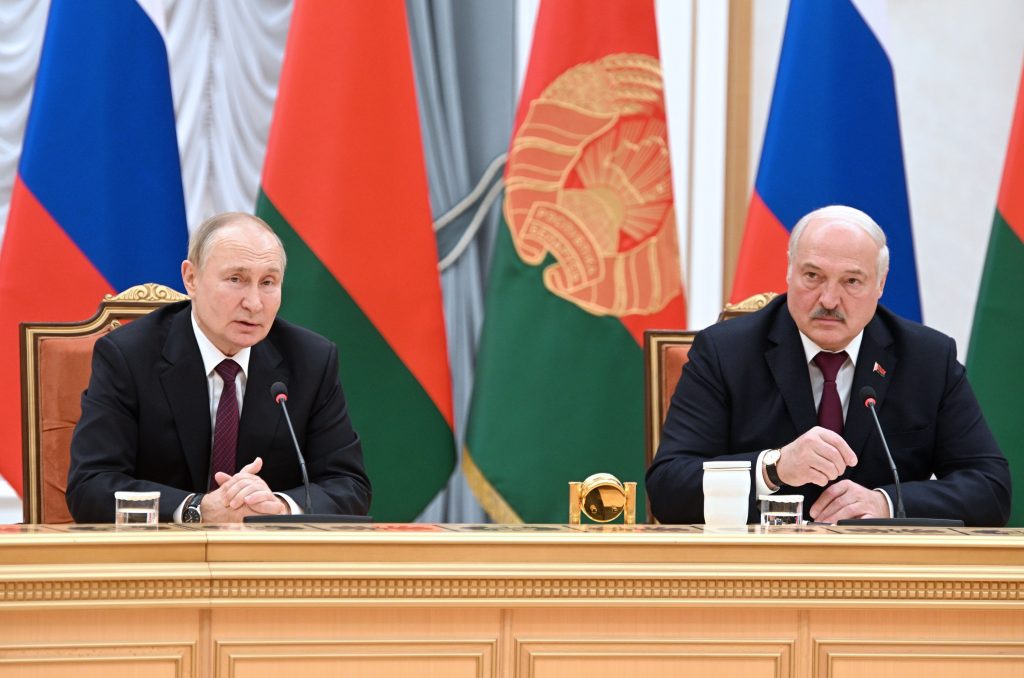
On Wednesday, April 5, as part of a two-day visit of the Belarusian delegation to Moscow, Vladimir Putin met with President of Belarus Alexander Lukashenko in the Kremlin. According to the official statements of the parties, the main topic of the conversation was the preparation for the meeting of the Supreme State Council of the Union State of Russia and Belarus. At the same time, behind closed doors, the parties managed to discuss several important foreign policy issues.
Key statements of the parties:
- Putin: “Of course, it is especially gratifying to note the results of our work in the economic sphere. Still, according to our statistics, our trade turnover has increased over the year, perhaps not to such large figures that we record with some other countries; it has grown by 12 per cent, but in absolute terms, it is impressive.”
- Lukashenko: “I closely watched your trip to Tula – a very correct, good trip. Again: even the working class is turning us towards import substitution. You were right then, citing agriculture as an example: everyone was frightened by hunger, cold, and so on – so what? Today there is nowhere to store bread in Russia – when was this? This is a huge harvest.”
Outcomes and outlook:
Frequent meetings between Vladimir Putin and Alexander Lukashenko have long become the norm. Putin puts pressure on the leader of Belarus with the aim of prompt certainty on the issues of full integration of the two countries within the framework of a single Union State. On the other hand, Lukashenko is trying to preserve the remnants of sovereignty while appealing to the position of China (Belarus’s second most important partner). The game of two presidents resembles political ping-pong. The main thing is that both presidents do not trust each other and treat each other with barely concealed irritation. But for political decisions, we are forced to organise such meetings.
According to Ascolta, Vladimir Putin again raised the issue of a possible transition of power in Belarus and the transfer of presidential powers to the more Moscow-oriented Natalya Kochanova. Even the variant of the Kochanova-Kanapatskaya tandem is being considered, which can attract part of the opposition to Kochanova’s side. In his usual manner, Lukashenko allegedly replied that it was necessary to consult with the Chinese comrades and suggested that the Russian leader himself discuss this issue with Xi Jinping (knowingly understanding the result).
- Meeting of the Supreme State Council of the Union State of Russia and Belarus
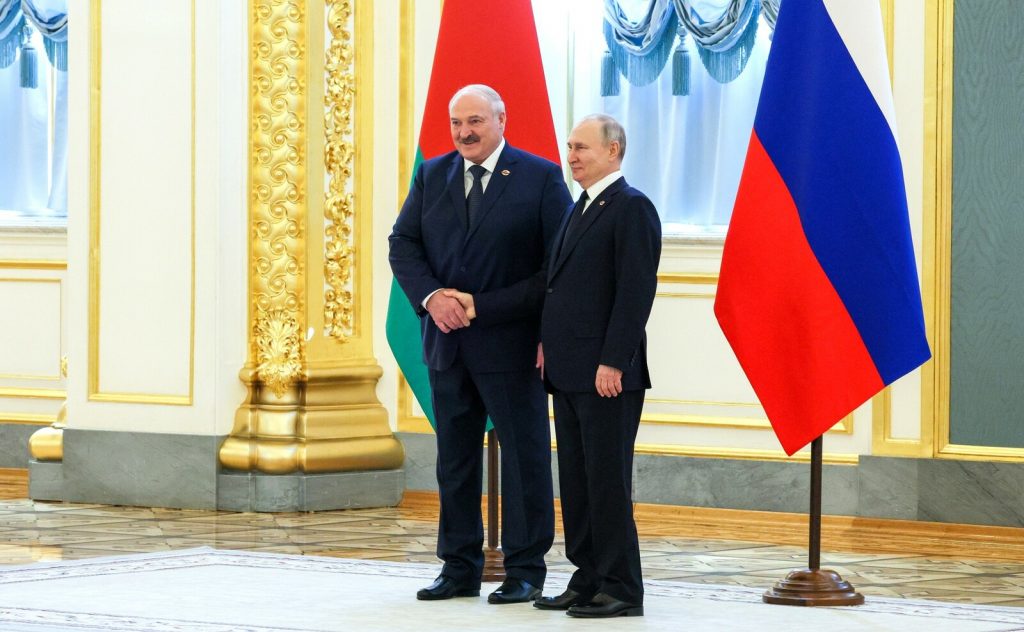
On Thursday, April 6, the Kremlin hosted a meeting of the Supreme State Council of the Union State of Russia and Belarus, which Vladimir Putin and Alexander Lukashenko chaired. According to the official report, during the meeting, the progress of the “Main Directions for the Implementation of the Provisions of the Treaty on the Establishment of the Union State for 2021-2023” was discussed. In addition, the document provides for joint work on 28 sectoral Union programs.
In addition to the presidents of Russia and Belarus, the meeting was attended by heads of governments, parliaments and heads of key areas of activity in the two countries’ governments. However, the main part of the meeting was held in a closed format, and only Lukashenko’s opening and Putin’s final speeches were publicly available.
Key statements of the meeting participants:
• Lukashenko: “Vladimir Vladimirovich and I held fundamental talks yesterday. We discussed issues, as journalists say, of a closed nature; they always exist. We paid more attention to security issues, the development of the military-industrial complex and related issues, and the defence of the Union State.”
• Lukashenko: “In terms of the totality of the results achieved over such a short period, our union is rightfully among the leaders among other integration associations.”
• Lukashenko: “Over the past 27 years, trade value has increased by more than 4.5 times. The key direction in bilateral relations is industrial cooperation. Today, these are connections of more than eight thousand Belarusian and Russian enterprises and hundreds of thousands of jobs.”
• Lukashenko: “Even before the [so-called] operation, we discussed with Vladimir Vladimirovich the difficult issue of import substitution in microelectronics. Yesterday Vladimir Vladimirovich and I discussed this topic for a long time. Knowing the respectful attitude of the President of Russia towards this topic, I called specialists in this field, and this was not the first time I visited Planar, which manufactures equipment and machines for the production of these microcircuits, chips, and so on. And, of course, we have the Integral enterprise and others that we have preserved – now we are building associations with the Russians.
• Lukashenko: “An effective system of defence and security of the Union State has been created, within which the regional grouping of troops and forces and the unified regional air defence system are successfully functioning.”
• Lukashenko: “Yesterday, I told the President that weapons were simply flowing from Ukraine to Russia, through Russia to us. Because our border with Ukraine is tightly closed, weapons have gone through the Bryansk and other regions.”
• Lukashenko: “In the context of the information, political and economic war unleashed against Belarus and Russia, the crisis of international law and the obvious impact of international institutions, we need to more coordinated, promptly defend and protect the national interests of Belarus and Russia.”
• Putin: “Today, the most important issues of the development of our integration were brought to the meeting of the Supreme State Council of the Union State: in the economy, in the field of security, defence, and the cultural and humanitarian sphere.”
• Putin: “Russia firmly occupies the place of Belarus’s largest trade and economic partner. In 2021 trade increased by 35 per cent to $40 billion; in 2022, it grew by another 12 per cent to a record $45 billion; we discussed this yesterday.”
• Putin: “To date, governments and relevant departments have already completed 74 per cent of the activities planned under the programs mentioned, and, as we see, this work brings concrete, tangible results. As we agreed today, we will continue this activity without slowing down.”
• Putin: “Russia and Belarus are building up and will continue to do so, as noted today, their cooperation in the field of defence and security, expanding cooperation in the military-technical sphere. And this, of course, meets the fundamental interests of our countries and peoples; it is really important, given the difficult international situation today.”
• Putin: “Another undoubted achievement of the common work is the expansion of Russian-Belarusian relations in the cultural, humanitarian and educational spheres.”
Outcomes and outlook:
The “Union State” has recently reached a certain peak of the integration process, after which slippage begins. Obviously, the parties are not ready to unite state structures. Therefore, Putin faced a dilemma: to demonstrate toughness and announce the Anschluss shortly before the elections or to preserve the remnants of the sovereignty of Belarus, primarily to have a convenient field for manoeuvring in the face of sanctions pressure on Russia. Moreover, several sanctions imposed against Russia do not apply to Belarus, and it is also important that Belarus is plus one guaranteed vote in support of Russia in the UN.
But for Putin, such a mechanism would protect Russia from surprises in the event of an uncontrolled change of power in Belarus. He would not want Belarus to give an unpleasant surprise due to a possible sharp turn towards the West. Putin can tolerate the flirtations of part of the Lukashenko team with the West, but not the transformation of Belarus into a second Ukraine.
Hence the desire to tie Belarus to Russia with military and economic obligations, which are becoming more and more from a visit to visit. In addition, Belarus is increasingly showing a tendency to become a “Chinese economic hub”, and Putin is in a hurry, realising that soon, as China strengthens its position in Belarus, Russia’s influence may weaken. For this reason, every meeting between Putin and Lukashenko and every minimal progress along the path of integration is vital for Moscow.
It is important to note that Belarus is the responsibility of Security Council Secretary Nikolai Patrushev: it is no coincidence that Patrushev flies to Minsk so often, and Boris Gryzlov, a close friend (since childhood) and classmate of Patrushev, has been appointed Russian Ambassador to Belarus. Therefore, the political future of Patrushev depends not least on the success of the integration processes.
- Visit of Russian Foreign Minister Sergey Lavrov to Ankara
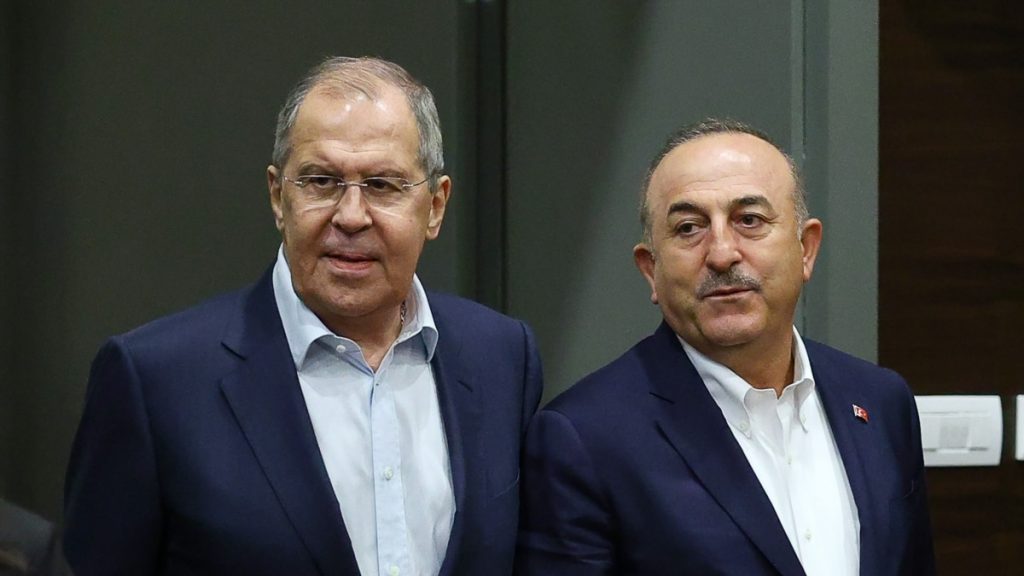
On Thursday, April 6, Russian Foreign Minister Sergei Lavrov arrived in Ankara on a working visit to hold talks with his Turkish counterpart Mevlut Cavusoglu. According to statements from both sides, during the meeting, Lavrov and Cavusoglu discussed bilateral relations between Russia and Turkey, the Akkuyu nuclear power plant, the situation in the Caucasus, the Middle East, the situation in Ukraine and the “grain deal”, as well as the normalisation of Syrian-Turkish relations. It is noteworthy that on the day of Lavrov’s arrival in Ankara (on the eve of the official negotiations scheduled for April 7), the Turkish Foreign Ministry published a video from an informal “no tie” dinner between Cevusoglu and Lavrov, which the Turkish side called “iftar dinner” – that is, breaking the fast (Turkey is now fasting Ramadan).
Key statements of the parties:
• Lavrov: “We, like in Turkey, have a proverb: “A friend is known in trouble”. We continue to help Turkish friends overcome the consequences of this natural disaster, including the supply of building materials for the restoration of infrastructure, as agreed by our presidents.”
• Lavrov: “From international affairs. We discussed in sufficient detail the situation in the Middle East and North Africa, the Transcaucasus, Central Asia and the Black Sea region.”
• Lavrov: “Increased attention was paid to the Syrian settlement in the context of the ongoing process of normalisation of Syrian-Turkish relations, initiated with Russian mediation.”
• Lavrov: “Other regional issues include Libya. This topic worries many after NATO’s barbaric aggression destroyed the country. The world community is struggling to put it back together again. Attempts were made repeatedly by various representatives of the EU and regional countries. But, unfortunately, so far, things are not moving at the pace that we would like.”
• Lavrov: “Regarding the settlement of relations between the Palestinians and Israel. Unfortunately, the process has been set far back due to many events, clashes, and unilateral measures the Palestinians and Israelis took.”
• Lavrov: “On the Transcaucasus. We are in favour of deepening cooperation between all the countries located there. We welcome the process of normalisation of relations between Armenia and Turkey launched with our support. We welcome the efforts to unblock transport links and communications in the region and for the post-conflict reconstruction of the South Caucasus.”
• Lavrov: “We talked about Ukraine. Our colleagues are deeply immersed in the factual side of the matter and understand the origins of what is happening. But, once again, attention was drawn to the fact that the destructive line of the “collective West” headed by Washington remains unchanged. It assumes, as it was proclaimed publicly and officially, the task of inflicting a strategic defeat on Russia on the battlefield.
• Lavrov: “Against the background of daily statements from Kyiv, Washington, Brussels that in no case should military operations be stopped and negotiations should be started, of course, against the backdrop of demands on Russia that contradict these postulates to stop the war and sit down at the table negotiations, we understand that all this is a rather unscrupulous method.
• Lavrov: “Russia will work, if necessary, even outside the framework of the Black Sea Initiative. We already have the opportunity to do this with Turkey and Qatar. The presidents discussed these plans. Russian exports to countries in need will not be affected. I can promise you that.”
• Cavusoglu: “[on Ukrainian issue] We have stated that the war must be ended by negotiations as soon as possible, and we reiterated that we, as Turkey, are ready to provide the best support.”
• Cavusoglu: “[on the ‘grain deal’] We pay significant importance to extending the agreement. This global crisis is especially important in reducing every household’s problem.”
Outcomes and outlook:
The Turkish topic is essential for Russia – especially given the precarious position of President Tayyip Erdogan on the eve of the presidential elections scheduled for May 14. According to sociological agencies, Erdogan has recently significantly strengthened his position, but not enough to ensure victory. Erdogan’s loss promises Russia a lot of problems: Kılıçdaroğlu, the leader of the Kemalists, will be more consistent in relations with NATO and the United States. Most likely, Turkey will join the pro-Western coalition on the issue of Ukraine, and on the topic of Sweden’s accession to NATO, it will be more accommodating.
In the current situation, Russia wants to get several concessions from Erdogan on the issues of the Caucasus and Syria. In exchange, it has already activated the factor of the grain deal, which could fail if Erdogan loses (the deal expires on May 17). This threatens Turkey with a new blow to the economy. Russia would also like to get more accommodating from Erdogan in the coming month and a half – the incident with the exclusion of Russian warships from Turkish ports is evidence that relations between Ankara and Moscow are not so smooth.
The important point is that Turkey once again emphasised the need to initiate a negotiation process between Russia and Ukraine. This contradicts the position of the United States, most of the European Union, Russia, and Ukraine. In this issue, Turkey is more in solidarity with China.
- Meeting of the Security Council of the Russian Federation
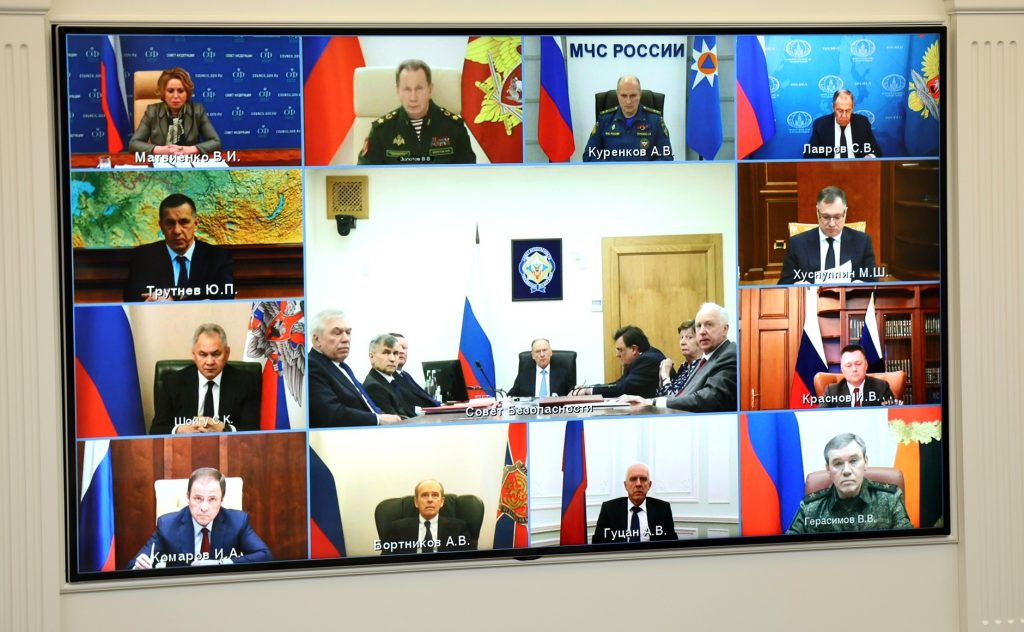
On Wednesday, April 5, the Security Council of the Russian Federation was held in the format of a videoconference dedicated to ensuring the rule of law, law and order and public security in the temporarily occupied territories of Donetsk, Luhansk, Zaporizhzhia and Kherson regions of Ukraine. Notably, Putin held this meeting with the so-called “heads” of the temporarily occupied territories. Moreover, part of the meeting was held in public this time, and Putin’s speech was broadcast to the media.
Putin’s key statements:
• “The task is to do everything to integrate these historically Russian lands of Donbas and Novorossiya into our country’s economic, legal and educational space as soon as possible.”
• “Purely criminal elements, including organised crime, drug dealers, financial scammers, and so on, are trying to take advantage of the situation in the [self-proclaimed] “DPR”, “LPR”, [temporarily occupied] Zaporizhzhia and Kherson regions.”
• “The enemy uses his unfinished underground, including various neo-Nazi and other radical groups, to intimidate people. This is where you need to be strong and efficient. Control over the situation must be reliably ensured.
• The report of Deputy Prime Minister Marat Khusnullin was also publicly announced, in which he reported on the process of construction and restoration of infrastructure facilities in the temporarily occupied territories of Ukraine.
Outcomes and outlook:
Obviously, the situation in the occupied territories leaves much to be desired for Russia: the activities of Ukrainian sabotage groups lead to more frequent elimination of representatives of the occupation administrations, and explosions of ammunition depots and equipment have become an almost daily occurrence. Russia is well aware that additional personnel are needed to restore and maintain order in the occupied territories. A new wave of mobilisation is unlikely to be popular among Russian citizens. Control over the territories requires new personnel decisions. The “Gauleiters” themselves do not have such personnel – and in Moscow, the locals are not particularly trusted. Also, a massive amount of funds is poured into restoring destroyed cities – while the share of corruption is traditionally very high. All this requires special attention and approach. It seems that Putin has begun to realise that the occupied territories are a suitcase without a handle. But it is still difficult for him to imagine how to escape this situation.
- Vladimir Putin’s meeting with the “heads” of the temporarily occupied regions of Ukraine
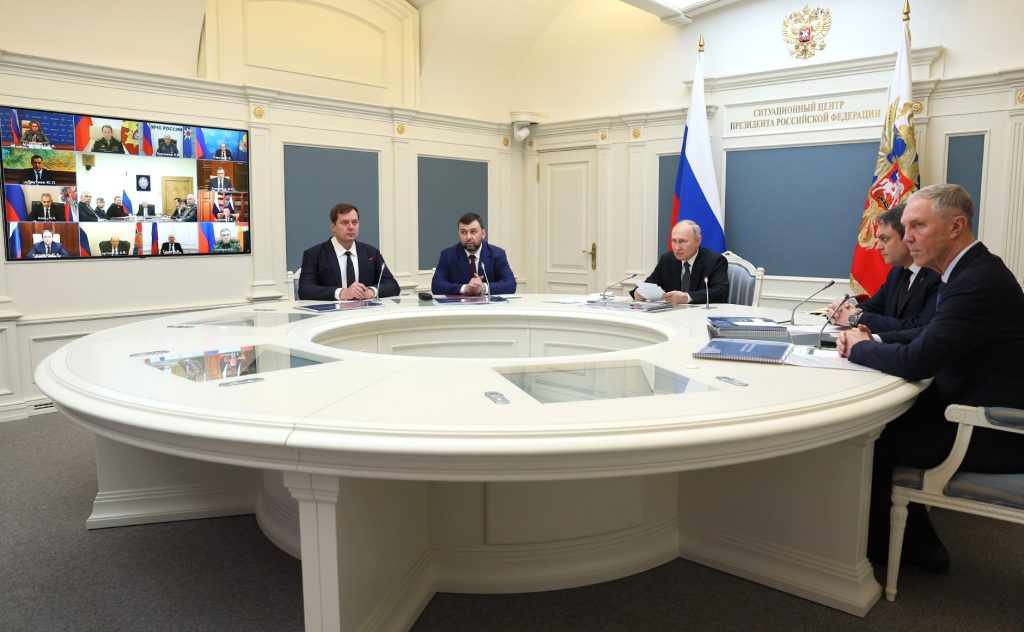
On Thursday, April 6, Vladimir Putin held separate meetings with the “heads” of the temporarily occupied Kherson and Zaporizhzhia regions, as well as the self-proclaimed “DNR” and “LNR”. General issues related to local infrastructure, social policy and security were discussed at each meeting. Notably, these meetings were held the day after the Security Council of the Russian Federation meeting, which was also attended by the “heads” of the temporarily occupied regions.
Outcomes and outlook:
The meeting with the “heads” of the occupied territories is purely decorative since Moscow does not consider either Pushilin, Pasechnik, Saldo, or Balitsky seriously. Therefore, this meeting is needed only for a television picture – as a signal that Putin is already confidently working with the “new territories” and considers them entirely Russian.
In general, the occupied territories are under the manual control of Sergei Kiriyenko, with whom the allocated funds, restoration programs, and personnel appointments are coordinated. The games with the Gauleiters will end either after the success of the Ukrainian counter-offensive or in September 2023, after the “elections” are organised in these territories, and the control teams change.
- Vladimir Putin’s visit to the Tula region
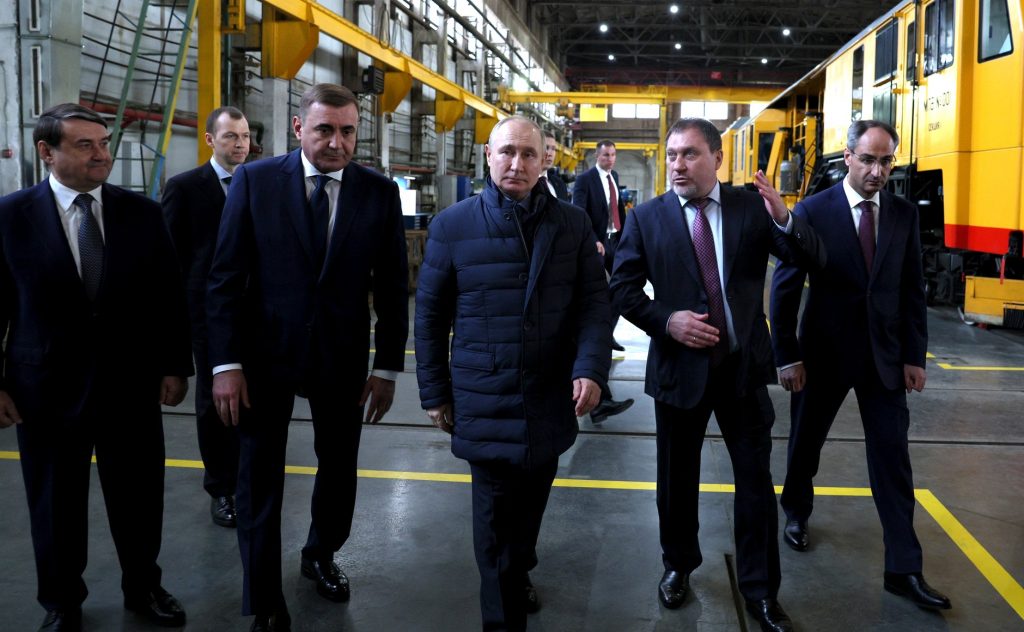
On Tuesday, April 4, Vladimir Putin arrived in Tula, where he got acquainted with the work of the Tula Railway Engineering Plant and chaired a meeting of the State Council Presidium on Industrial Development. Putin, Presidential Aide and Secretary of the State Council Igor Levitin, Presidential Plenipotentiary Envoy to the Central Federal District Igor Shchegolev and Governor of the Tula Region Alexei Dyumin took part in the events.
Putin’s key statements:
Meeting with the workers of Tulazheldormash JSC:
- “Agriculture is not just Soviet collective farms; it is a high-tech industry today. It pulled along a lot of other industries: agricultural machinery, mineral fertilisers, even software, and so on, space tools are used for agricultural production.”
- “In critical areas, we must, of course, strive for full sovereignty. To achieve this, we will go in several directions; we are already going.”
Meeting of the Presidium of the State Council:
• “On our agenda today, one of the highest priority issues is the development of Russian industry, our industrial potential, including taking into account such a factor as external pressure.”
• “I would like to note here that we all understand that sanctions, of course, are for a long time; therefore, along with priority measures to replace imported technologies and products, medium- and long-term transformations are needed here, aimed at the strategic goals of the country’s sovereign development.”
• “Developing technology partnerships with friendly foreign companies is also necessary more dynamically. Therefore, we are open to full-fledged and long-term cooperation with all interested partners.”
• “Unfortunately, we observed a slight decline in processing; the fall was 1.3 per cent [last year], in January-February [2023] compared to the same period in 2022, the decline continued – 1.7 per cent. But in 2023, an increase in the volume of manufacturing output is still predicted – about one per cent in real terms compared to 2022.
• “Let me remind you that we have set an ambitious but achievable goal, an achievable goal and a feasible task – to ensure in 2023 the attraction of investments in projects for the production of priority industrial products in the amount of at least two trillion rubles, and by 2030 – more than 10 trillion rubles”.
Outcomes and outlook:
An important point is the choice of the place for Putin’s trip. The Tula region is ruled by Alexei Dyumin, the former head of Putin’s bodyguards, who experts constantly tip to be either the government or Putin’s successor. The trip to Dyumin made many tenses – a new personnel offer for Dyumin may follow this trip. It is no coincidence that immediately after the trip, the media began an active “shelling” of Dyumin – he was criticised for restoring the study of drawing in schools. Most of all, Dyumin’s criticism comes from the camp of the head of Rostec, Sergei Chemezov – he could feel that the “engineering and technical” initiative of the governor of the Tula region sounded for a reason.

